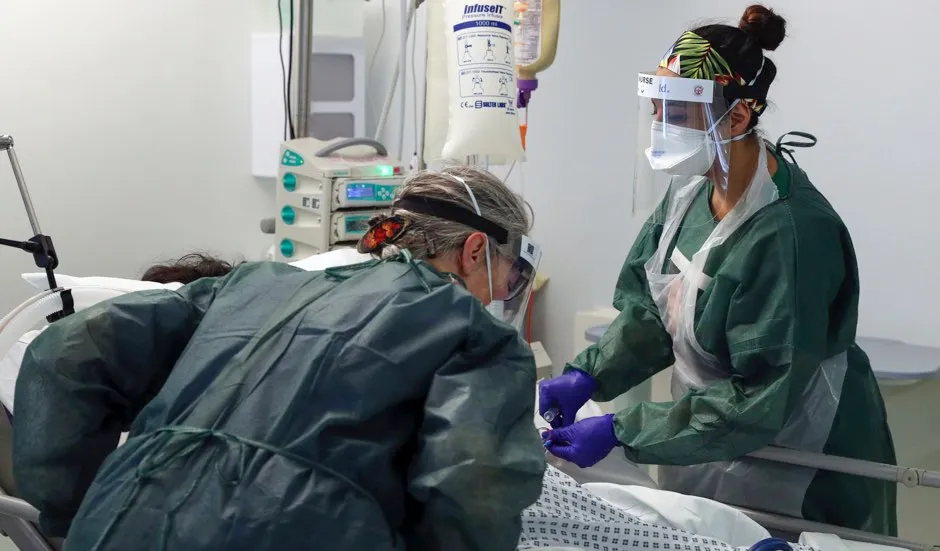Trials of a coronavirus treatment inhaled directly into the lungs through the use of a nebuliser found that hospital patients who took the drug had a 79 per cent lower risk of developing severe disease.
According to early results of the study, patients who received the drug, known as SNG001, were more than twice as likely to recover from COVID-19 as those who received a placebo.
The treatment has been developed by the pharmaceutical company Synairgen.
Previous studies involving asthmatic patients have shown that the drug is well tolerated, enhances the lungs’ anti-viral defences and improves lung function during cold or flu infection.
Read more about coronavirus treatments:
- COVID-19: Have we been treating the disease wrong?
- Llama-based antibody treatment 'neutralises' virus
- Simple salt water solution 'could help reduce coronavirus symptoms'
The current trial was carried out on a double-blind and placebo-controlled basis – meaning neither the researchers nor the 101 patients knew whether they were receiving SNG001 or a placebo.
It found that the odds of developing severe disease – needing ventilation or resulting in death – during the treatment period of up to 16 days were reduced by 79 per cent for patients receiving the drug compared with patients who received the placebo.
Results of the study indicate that, over the treatment period, the measure of breathlessness was markedly reduced in patients who received SNG001.

Three people (6 per cent) died after being randomly assigned the placebo, while there were no deaths among those who received the drug, Synairgen said.
In patients with more severe disease at time of admission, SNG001 treatment increased the likelihood of hospital discharge during the study, but researchers say the difference was not statistically significant.
Read the latest coronavirus news:
- Coronavirus vaccine: 105 people take part in Imperial COVID-19 trial
- Physical distancing and closures 'a key component' in decreasing number of new cases
- Is the coronavirus airborne?
Professor Tom Wilkinson, professor of respiratory medicine at the University of Southampton and trial chief investigator, said he is “delighted with the positive data produced from this trial”.
He added: “The results confirm our belief that interferon beta, a widely known drug that, by injection, has been approved for use in a number of other indications, has huge potential as an inhaled drug to be able to restore the lungs’ immune response, enhancing protection, accelerating recovery and countering the impact of SARS-CoV-2 virus.”
Professor Stephen Holgate, Medical Research Council clinical professor of immunopharmacology at the University of Southampton and co-founder of Synairgen, said the treatment “restores the lungs’ ability to neutralise the virus, or any mutation of the virus or co-infection with another respiratory virus such as influenza or RSV, as could be encountered in the winter if there is a resurgence of COVID-19.”
How do viruses make us ill?
Viruses are extremely tiny parasites made of genetic material, wrapped in proteins and sometimes an outer membrane layer, which hijack living cells to reproduce themselves. We’re exposed to viruses every day, but our immune system prevents the vast majority of them from taking hold – especially those that we’ve fought off before, or been vaccinated against.
The first stages of an infection happen when a virus gets past our physical barriers of skin and mucus, and enters a suitable cell. Once inside, a virus can take over the cell, forcing the cell to make many copies of the virus (replicate), which damages the cell and sometimes kills it. The newly-made viruses are released to find a new cell. We get ill when a virus has established an infection in many cells, and our body’s normal functioning changes.
Viruses often infect specific places in our bodies, which is where we feel their effect. Rhinoviruses infect our upper airways behind our nose, and we respond with snot and sneezes: a common cold. The coronavirus that emerged in 2019 (called SARS-CoV-2) infects our lower airways, including our lungs, leading to pneumonia.
Our body fights viruses by creating an inflammatory response and calling in specialist cells from our tissues and organs. Some of these cells can make antibodies against the virus, some destroy the infected cells, and others build a memory of the virus for next time. Some of the things that make us feel ill – snot, fever and swollen lymph nodes, for example – are due to our body’s battle to get rid of the virus, not because of the virus itself.
Read more:
